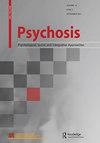Basic demographic outcomes: additional findings of a single-blind, randomised, controlled trial on metacognitive training for psychosis
IF 1
4区 医学
Q4 PSYCHIATRY
Psychosis-Psychological Social and Integrative Approaches
Pub Date : 2021-07-19
DOI:10.1080/17522439.2021.1952296
引用次数: 1
Abstract
ABSTRACT Background Evidence of the effect of metacognitive and social cognitive impairment on the symptoms and functioning of patients diagnosed with schizophrenia led to the development of the Metacognitive Training. We hypothesise that improvement in these cognitive functions leads to less severe symptoms and to better adaptation to real-life social situations, which would be reflected in aspects of the patients’ demographic status. Method We report the additional findings of a randomised, controlled, single-blind study with a six-month follow-up period. We provided 36 patients with training to improve their metacognition and social cognition. The control group received treatment as usual. Symptom severity, measured by the PANSS scale, and demographic data were assessed at baseline and six months after the training. Results Compared to the control group, the intervention group showed less severe symptoms, and achieved more progress in demographic status. These steps may be statistically non-significant; yet, may represent crucial changes in some patients’ lives. Discussion Metacognitive Training is not only an appropriate method to decrease symptom severity, but the training of metacognitive and social cognitive functions can also contribute to a better adaptation to real-life.基本人口学结果:一项关于精神病元认知训练的单盲、随机、对照试验的额外发现
背景元认知和社会认知障碍对精神分裂症患者症状和功能影响的证据导致了元认知训练的发展。我们假设,这些认知功能的改善会导致症状不那么严重,并能更好地适应现实生活中的社会状况,这将反映在患者的人口统计状况方面。方法:我们报告了一项随机、对照、单盲研究的额外发现,随访期为6个月。对36例患者进行元认知和社会认知训练。对照组患者按常规治疗。通过PANSS量表测量的症状严重程度和人口统计数据在基线和培训后6个月进行评估。结果与对照组相比,干预组症状较轻,人口学状况有较大改善。这些步骤可能在统计上不显著;然而,这可能会对一些病人的生活产生重大影响。元认知训练不仅是减轻症状严重程度的合适方法,而且元认知和社会认知功能的训练也有助于更好地适应现实生活。
本文章由计算机程序翻译,如有差异,请以英文原文为准。
求助全文
约1分钟内获得全文
求助全文
来源期刊
CiteScore
2.20
自引率
8.30%
发文量
36

 求助内容:
求助内容: 应助结果提醒方式:
应助结果提醒方式:


